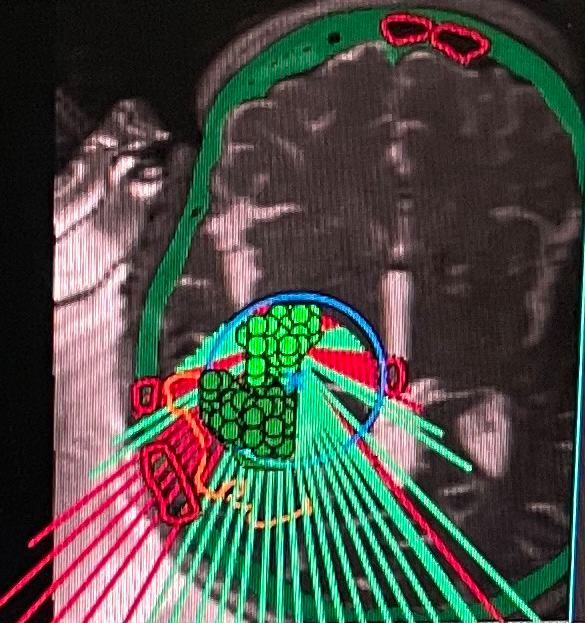Key Points
- In March, Barbara was diagnosed with an aggressive malignant brain tumor called a glioblastoma.
- She was the first patient to be treated in a focused ultrasound clinical trial at the University of Virginia.
- Read Barbara’s story and learn about her hopes for how focused ultrasound could affect her future and that of countless others.
 In her own words, Barbara Frisbie wholeheartedly “loves life.” And she has much to love about her life in Kilmarnock, Virginia, with her husband of 58 years, Rick, and their two sons and four grandchildren.
In her own words, Barbara Frisbie wholeheartedly “loves life.” And she has much to love about her life in Kilmarnock, Virginia, with her husband of 58 years, Rick, and their two sons and four grandchildren.
Having grown up in France, Barbara earned her Master’s degree in French literature and taught French to high school students. She served as the Executive Director of the Virginia Foundation for Independent Colleges, was a Trustee of Randolph Macon Academy and a docent at the Kreeger Museum in Washington, DC. Barbara is also a proud member of the Daughters of the American Revolution.
She has also always enjoyed her health and exercised regularly. “I walk four miles a day with friends and am a very active person.”
However, that all changed on March 5, 2021, when she suffered a seizure.
“I was flown to the hospital at Virginia Commonwealth University in Richmond, where I was diagnosed with a glioblastoma,” she recalls.
Glioblastomas (GBMs) are an aggressive type of malignant brain tumor. The current standard of care for this diagnosis is surgery to remove the bulk of the tumor, followed by chemotherapy and radiation. Unfortunately, the prognosis is generally poor.
After completing surgery and radiation, Barbara considered the poor track record of conventional treatments and decided to pursue a different course: noninvasive focused ultrasound.
“Rick and I have been involved with the Focused Ultrasound Foundation for many years,” says Barbara. “We believe in the technology and the promise that it holds for humanity. Unfortunately, our interest in focused ultrasound has turned very personal in the past few years. Our daughter-in-law recently passed away from liver cancer, and now I am battling this diagnosis. We understand that focused ultrasound could play a role in treating these types of cancers, and I feel fortunate to be able to take part in a clinical trial. I want to survive. What do I have to lose?”
Barbara was the first patient to be treated at the University of Virginia (UVA) using focused ultrasound to assist in the delivery of chemotherapy to the tumor site.
The trial, led by Jason Sheehan, MD, PhD, Professor of Neurological Surgery at UVA and the Foundation’s Senior Advisor for Brain Tumor Research, is investigating using focused ultrasound to temporarily and reversibly open the blood-brain barrier to allow higher concentrations of chemotherapy to enter the brain. The aim is to deliver enough of the drug to destroy any residual tumor tissue and hinder regrowth.
“The use of focused ultrasound to precisely and temporarily open the blood-brain barrier should permit appreciably more chemotherapy to be delivered to brain tumors and, hopefully, lead to therapeutic benefits,” says Dr. Sheehan. “This approach could be a game changer.”
“On the morning of treatment, I was nervous, and it was an exhausting day,” Barbara recalls. “The MRI machine was very noisy, and I found it stressful. But I was also surprised by the number of people in the room observing my treatment. It struck me that this trial is very important for focused ultrasound and its role in treating GBM.
“Afterwards, Dr. Sheehan seemed very happy with the procedure, which assured me.”
“The courage and resiliency of Ms. Frisbie and so many of my brain tumor patients are inspirational and help motivate us to pursue new approaches to improve outcomes,” says Dr. Sheehan.
“I was able to go home the same day,” recalls Barbara. “I was tired and relieved it was over. But I was also very grateful.
“Now, I take a lot of medicine and frequent naps. I returned to UVA recently for my second procedure, and that went well.* I still walk each day, and I still love life!”
Barbara is greatly appreciative of the clinical team at UVA for this opportunity.
“Dr. Sheehan and the rest of the physicians are wonderful. And I also want to acknowledge Matthew Patterson, the study coordinator. He was amazing, and I felt very supported by him as I navigated the process. Again, I am so proud to be the first patient treated at UVA in this landmark trial.”
And as for the Foundation, Barbara hopes that its work establishes focused ultrasound as a treatment option for many other patients.
“I wish that everyone would contribute to the Focused Ultrasound Foundation. The work the Foundation does and the projects they fund impact real lives, like mine, and the promise the technology holds is real and should be funded and implemented as rapidly as possible. I hope it works for me and for others in the future.”
*Patients in this trial undergo a total of five focused ultrasound procedures, each three weeks apart.
